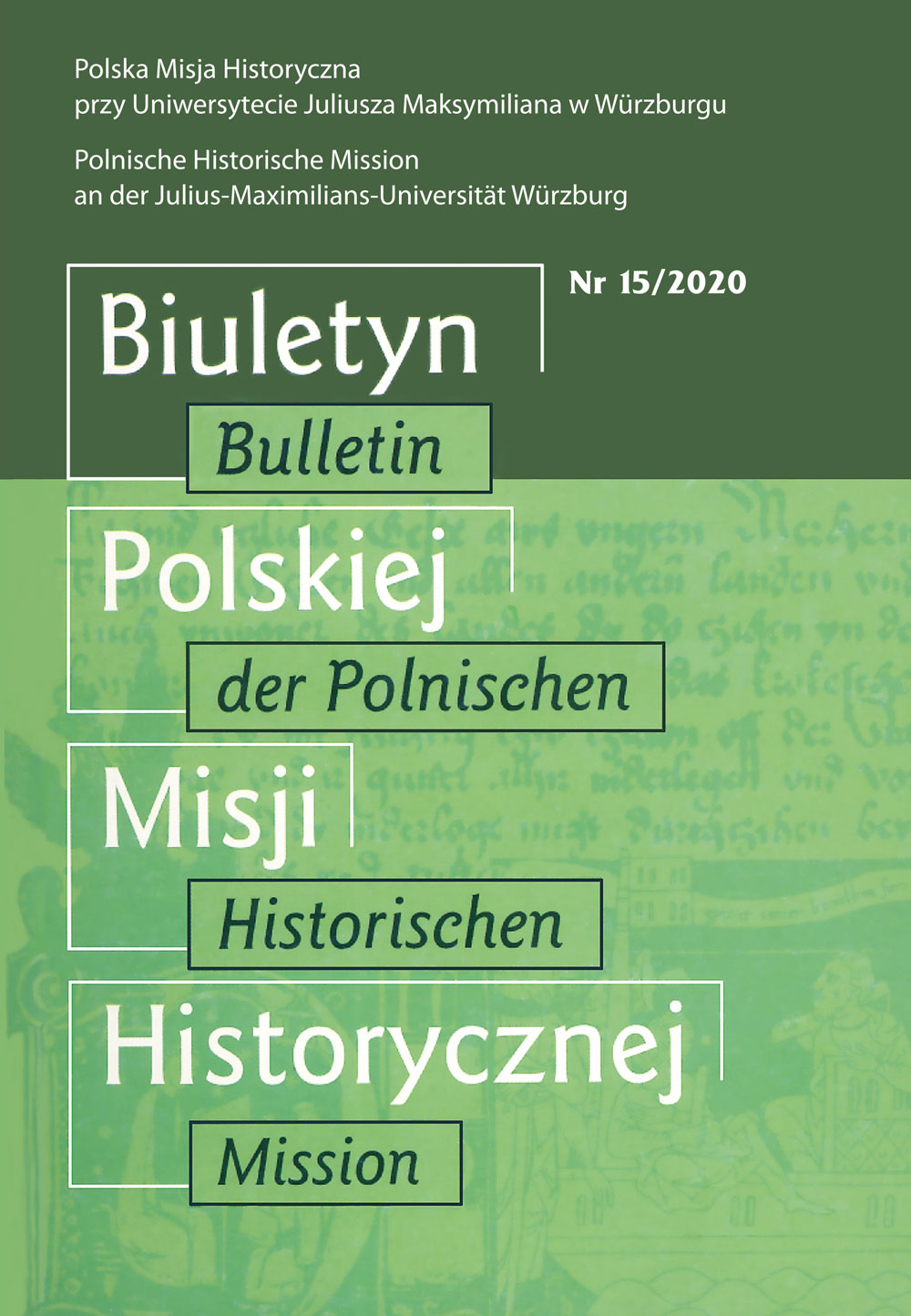Thesen zu frühneuzeitlichen jesuitischen Studentenkulturen in Ostmitteleuropa am Beispiel der Universitas Leopoldina Breslau
DOI:
https://doi.org/10.12775/BPMH.2020.006Słowa kluczowe
kultura studencka, uniwersytet, jezuici, Śląsk, WrocławAbstrakt
Tezy o nowożytnej jezuickiej kulturze studenckiej w Europie Środkowo-Wschodniej na przykładzie Universitas Leopoldina we Wrocławiu
Jezuicka kultura studencka na Universitas Leopoldina we Wrocławiu przedstawia się w swoich postawach w równej mierze dewiacyjnie i konformistycznie. Jezuiccy studenci we Wrocławiu nie byli per se bardziej skłonni się dopasowywać niż studenci protestanccy poza Śląskiem. W Europie Środkowo-Wschodniej przede wszystkim konfesjonalizacja wpływała na jezuicko ukształtowaną kulturę studencką oraz pobożność. Ten proces jest widoczny także na wrocławskiej Leopoldinie, idealnie typowym jezuickim uniwersytecie. Tłumaczenie Renata Skowrońska
Bibliografia
Joseph von Eichendorff, Schlesische Tagebücher, hg. v. A. Riemen, (1988).
Quellenbuch zur Geschichte der Universität Breslau 1702–1811, hg. v. N. Conrads, (2003).
Asche M., Kollegien, Kompetenz und Kostenkalkül. Jesuitische Erfolgsrezepte an Universitäten im konfessionellen Zeitalter, in: Historisches Jahrbuch, 133 (2013), S. 57–75.
Asche M., Gerber S., Neuzeitliche Universitätsgeschichte in Deutschland. Entwicklungslinien und Forschungsfelder, in: Archiv für Kulturgeschichte, 90 (2008), S. 159–201.
Asche M., Schlesische Studenten und Professoren an südwestdeutschen Universitäten im Konfessionellen Zeitalter (1550–1620), in: Schlesien und der deutsche Südwesten, hg. v. J. Bahlcke, (2012), S. 85–104.
Andrea F., Die Geschichte der Jesuitenuniversität, in: Die Universität zu Breslau, in: A. Andrea, A. Griesebach, (1928), S. 5–26.
Fazekas I., Jesuitenfrömmigkeit und Priesterausbildung am Pazmaneum, dem Ungarischen Seminar in Wien, in: Jesuitische Frömmigkeitskulturen. Konfessionelle Interaktion in Ostmitteleuropa 1570–1700, hg. v. A. Ohlidal, S. Samerski, (2006), S. 163–176.
Füssel M., Studentenkultur in der Frühen Neuzeit. Praktiken – Lebensstile – Konflikte, in: Wissenschaft mit Zukunft. Die ‚alte‘ Kölner Universität im Kontext der europäischen Universitätsgeschichte, hg. v. A. Berger, A. Speer, (2016), S. 173–204.
Füssel M., Wagner W., Studentenkulturen. Begriff, Forschungsstand, Perspektiven, in: Studentenkulturen, hg. v. M. Füssel, (2014), S. 39–55.
Gatz E., Priesterausbildungsstätten der deutschsprachigen Länder zwischen Aufklärung und zweitem Vatikanischen Konzil, (1994).
Gehrke R., Die Aufhebung des Jesuitenordens und ihre Folgen für die Leopoldina, in: Die tolerierte Universität. 300 Jahre Universität Breslau (1702–2002), hg. v. N. Conrads, (2004), S. 225–243.
Hardtwig W., Sozialverhalten und Wertewandel der jugendlichen Bildungsschicht im Übergang zur bürgerlichen Gesellschaft, in: Vierteljahrsschrift für Sozial- und Wirtschaftsgeschichte, 73 (1986), S. 305–335.
Hoffmann H., 300 Jahre Marianisches Streben unter Gymnasiasten und Studenten in Breslau, (1940).
Hoffmann H., Friedrich II. von Preussen und die Aufhebung der Gesellschaft Jesu, (1969).
Hensel M., Pennalismus. Ein Phänomen protestantischer Universitäten im 17. Jahrhundert, (2014).
Kaufmann T., Dreißigjähriger Krieg und Westfälischer Friede. Kirchengeschichtliche Studien zur lutherischen Konfessionskultur, (1998).
Kuhn A., Schweigard J., Freiheit oder Tod. Die deutsche Studentenbewegung zur Zeit der Französischen Revolution, (2005).
Krug-Richter B., Frühneuzeitliche Universitätskulturen. Kulturhistorische Perspektiven auf die Hochschulen in Europa, hg. v. ders., R. Mohrmann, (2009).
Meiners C., Geschichte der Entstehung und Entwicklung der hohen Schulen unseres Erdteils, (1802).
Müller R., Studentenkultur und akademischer Alltag, in: Geschichte der Universität in Europa. Von der Reformation zur Französischen Revolution (1500–1800), hg. v. W. Rüegg, (1996), S. 263–286.
Rabe C., Alma Mater Leopoldina. Kolleg und Universität der Jesuiten in Breslau 1638–1811, (1999).
Reinkens J., Die Universität zu Breslau vor der Vereinigung der Frankfurter Viadrina mit der Leopoldina, (1861).
Schindling A., Konfessionalisierung und die Grenzen von Konfessionalisierbarkeit. Die Territorien des Reichs im Zeitalter der Reformation und Konfessionalisierung, hg. v. ders., W. Ziegler, (1997), S. 9–44.
Vogel D., Der Untergang der Gesellschaft Jesu als europäisches Medienereignis (1758–1773).
Publizistische Debatten im Spannungsfeld von Aufklärung und Gegenaufklärung, (2006).
Pobrania
Sklep wydawnictwa:
Opublikowane
Jak cytować
Numer
Dział
Licencja
Autor zgłaszający tekst do publikacji zobowiązany jest do ujawnienia wszystkich autorów uczestniczących w przygotowaniu tekstu oraz (jeśli dotyczy) wskazanie źródeł finansowania publikacji, wkładzie instytucji naukowo-badawczych, stowarzyszeń i innych podmiotów („financial disclosure”). W wypadku tekstów przygotowanych przez dwóch lub wielu Autorów, Autorzy zobowiązani są do przesłania do Redakcji oświadczenia o wkładzie poszczególnych Autorów w powstanie publikacji (z podaniem ich afiliacji oraz wskazaniem Autora/Autorów koncepcji, założeń, metod itp.). Główną odpowiedzialność za tekst ponosi Autor zgłaszający go Redakcji.
Informujemy, że Redakcja Biuletynu Polskiej Misji Historycznej korzysta z programu antyplagiatowego iThenticate, od 2016 roku każdy artykuł jest sprawdzany pod względem oryginalności. Redakcja oświadcza, że wykryte przypadki nierzetelności naukowej będą dokumentowane oraz upubliczniane poprzez powiadomienie odpowiednich podmiotów (instytucje zatrudniające Autorów, instytucje i stowarzyszenia naukowe itp.).
Autorzy/Autorki przesyłając artykuł przez stronę APCz składają oświadczenia dotyczące praw autorskich oraz przygotowania artykułu zgodnie z zasadami etycznymi dla prac naukowych. Oswiadczenie jest także dostępne w formie dokumentu word (oświadczenie).
Statystyki
Liczba wyświetleń i pobrań: 974
Liczba cytowań: 0



